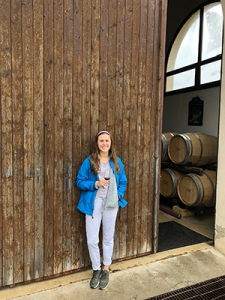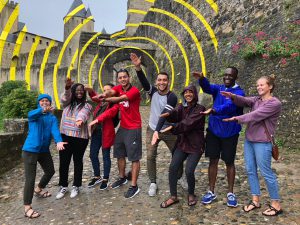Students in the UF/IFAS College of Agricultural and Life Sciences (CALS) gain hands-on experiences through unique internships all over the world. This summer, we asked several students about their internship or job in their field of study. This profile features fourth-year plant science major, Mia Acker, who is specializing in crop ecology.

Q: Who are you interning for?
I’m interning at the Domaine de Montels vineyard and winery in Albias, France.
Q: How did you get your internship?
I was placed at my internship through the UF in Purpan study abroad program. My activities here for the last month have covered everything from pruning grape vines, helping to bottle, label, and mix wine, and working in their wine shop.
Q: What is the most exciting part of your internship?
The most exciting part of my internship is experiencing so many facets of a successful agriculture business. In France, they have wine regions and specialty terms called Appellation of Origin (AOP) certification. AOP, IGP, and internationally medaling wines are all produced on the Domaine’s 40-50 acres of vineyard. Here, high-quality value-added products are created. In the U.S., though quality is very important at the vegetable farms I’ve worked on, there is not as much focus on value-added products. Through my time here, I’ve been able to see all the hard work and special care that goes into producing these grapes, fermenting and possibly blending them into wine, then marketing it directly to consumers or a larger seller.

Back at UF, I work at the Field and Fork Farm and Gardens so I’ve already had lots of experience with the plants themselves. Here, I’ve seen the transformation and distribution of produce into something beautiful and completely new. It’s seeing the post-harvest processing and business operations that have excited me the most since I previously haven’t had much experience in that side of agriculture.
Q: What have you learned about yourself through this internship experience?
Living and working in another culture comes with its challenges, whether they be linguistic or cultural. I admire French culture and their ability to not micro-manage their time, valuing human interaction above all else. Through this program I have learned how to keep an open mind and how to adapt to new and unfamiliar situations. New cultural experiences can be exciting, unnerving, or even offensive.
The most important practice I’ve learned is that in order to fully appreciate a new culture, it is imperative that you don’t immediately react. If you know the language, ask questions and communicate. When all else fails, google translate has been my best friend! There is so much to learn when two cultures come together, and I’ve learned that my curiosity is very present. Now that I’ve been able to live with a French family for the last month, I’ve developed skills to help me in new cultural experiences to come.
Q: What brought you to CALS?
I’ve always known I wanted to go into the sciences from a young age. Upon entering college, however, I was greeted with a plethora of majors to choose from. CALS provided me with a major and specialization that fit my exact area of interest, crop ecology. I also appreciated how CALS required a public speaking course for all students. The skills I acquired through that class still come in handy!

Q: In what ways has CALS prepared you for both your internship and future career?
As mentioned, my CALS major requires a public speaking course and economics course. I feel they’ve been extremely helpful in my professional development. No matter what field of work I decide to go into, effective interpersonal communication and an economics background are necessary to have. My collaborative style group projects in several classes, paired with research projects and presentations, have given me invaluable experience to effectively communicate.
Q: What are your future career goals?
Ultimately, I would like to teach and conduct research at a university for a career. I have a passion for learning and teaching others about plant production and food security issues. A dream of mine, though, is to research indigenous people’s medicinal plant use. Plants nourish us in more ways than just the calories and nutrients they provide. After scratching the surface of my Native American ancestry and their medicinal use of plants, I would like to conduct research and hopefully bring scientific credibility to those practices. I am pursuing a chemistry minor now and hope to go on to a Botany master’s or Ph.D. program in the near future to continue my path toward education and research.
 0
0
